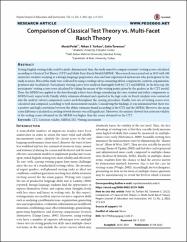Comparison of Classical Test Theory vs. Multi-Facet Rasch Theory
Künye
POLAT, Murat, Nihan S. TURHAN & Çetin TORAMAN. "Comparison of Classical Test Theory vs. Multi-Facet Rasch Theory". Pegem Journal of Education and Instruction, 12.2 (2022): 213-225.Özet
Testing English writing skills could be multi-dimensional; thus, the study aimed to compare students’ writing scores calculated
according to Classical Test Theory (CTT) and Multi-Facet Rasch Model (MFRM). The research was carried out in 2019 with 100
university students studying at a foreign language preparatory class and four experienced instructors who participated in the
study as raters. Data of the study were collected by using a writing rubric consisting of four components (content, organization,
grammar and vocabulary). Participants’ writing scores were analysed thoroughly both by CTT and MFRM. At the first step, the
participants’ writing scores were calculated by taking the means of the writing points given by the graders in the CTT model.
Then, the MFRM was applied to the data through a three-facet design considering the rater, student and rubric components as
MFRM facets respectively. Finally, ability estimates obtained and reported in the logit scale via Rasch Analysis were converted
into the analytic rubric’s component scores used throughout the scoring procedure. Finally, two sets of writing scores were
calculated and compared according to both measurement models. Considering the findings, it was summoned that there was
a positive and high correlation between the ability estimates found according to the CTT and the MFRM. However, the mean
score difference calculated according to both theories was still significant. Moreover, the analyses showed that criterion validity
of the writing scores obtained via the MFRM was higher than the scores obtained via the CTT.



















